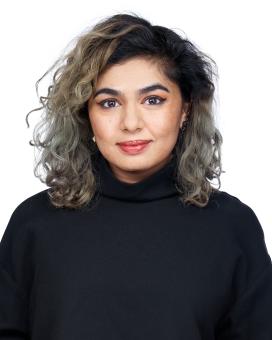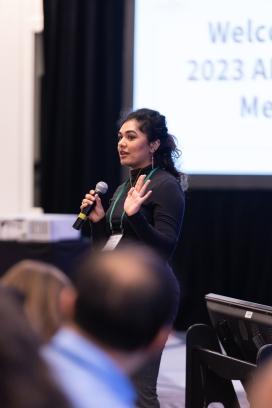Meet REVISE: Sana Karim
We are excited to share our interview with Sana Karim, the project manager of digital infrastructure for the REVISE Team.
I hope that the REVISE center can serve as a source for anyone at any point in their informal STEM journey. Whether that’s a researcher with years of experience in the field learning about more equitable research practices or an early-career practitioner discovering where they can offer input for change, the REVISE center will be able to provide the resources or point them where they need to go.

What drew you to STEM? To informal science?
I’ve always been fascinated about why things are the way they are. I grew up loving logic games, completing puzzles, and intrigued by anything that required me to go through a step-by-step process to figure things out. It made sense, then, to be drawn to STEM. As a desi (someone who identifies as South Asian), there was always a cultural expectation to go into a STEM field, and my parents were delighted that I had the interests and logical tendencies that made me a fit for these types of careers.
The anxieties that came with being a top-performer in a competitive school district, classes that didn’t interest me, and deep down, a rebellion against complying with the cultural expectation of going into medicine, engineering, or the sciences, all prevented me from considering it as a career, however.
I also had a significantly higher interest in the arts. My love for writing and wanting to be an author has transformed over time - wanting to write characters with substance led me to an interest in psychology, which led me to wanting to learn more about the best ways to give youths with marginalized identities more confidence as they develop. All of this led me to getting my masters in applied developmental psychology. In my program, I combined all of these interests (and more!) and was interested in creating spaces for marginalized youths to explore STEM topics using fictional books in online spaces.
While working with REVISE is my first time actively participating in the informal science field, it’s helped me realize that it’s a space I’ve already been in.
What are you most excited about or looking forward to accomplishing while working on REVISE?
I’m looking forward to developing online - and supporting in-person - spaces for anyone to learn about informal sciences and where they belong.
I’m also interested in spotlighting those that the field has neglected and reminding them that they are vital to this space. There is so much history in how people learn about and engage in STEM topics, but we have been so limited in what we think STEM is that most of us have no idea what else is out there - even if we’re part of that culture! REVISE can bring projects and organizations who do ISE research and programming that’s focused and builds on cultural diversity to the forefront to show others that these programs exist. Hopefully, that will inspire them to engage in said programs or realize that they also have the opportunity to get their programs funded if they do similar work.
How do you engage community members?
It seems cliche, but listening and giving space for others to share what they need and how they feel is the best way to engage with them. This goes for everyone when relationship-building - not just those in the communities that one partners with. Community members, who I’m defining here as those who are the users and audience for ISE projects and programs, all bring their own strengths and concerns to these spaces, and it’s important to hear and work with what they share instead of simply making assumptions.

What do you envision the role of the REVISE center to be in the informal STEM community?
Like my colleagues, I hope that the REVISE center can serve as a source for anyone at any point in their informal STEM journey. Whether that’s a researcher with years of experience in the field learning about more equitable research practices or an early-career practitioner discovering where they can offer input for change, the REVISE center will be able to provide the resources or point them where they need to go.
Who would you like to see represented more?
I would love to see more representation from those that the field has not just neglected, but harmed in its history. I think about how many of the buildings where informal STEM is practiced and studied have taken over the homes and displaced Black and Brown communities, for example. Informal STEM is also a discipline that has historically been a part of these communities too. In some ways, underserved communities have turned to informal STEM because they have been rejected or don't see themselves represented in formal STEM spaces because of its Western and Eurocentric focus.
I would also like to see more youth voices represented in the informal STEM field. The majority of informal STEM programs are designed with youths as their primary audience, yet we see little representation of them outside their participation in the program. I would love to give more youths, especially marginalized youths, the opportunity to share their experiences in whatever way that they’re most comfortable doing.